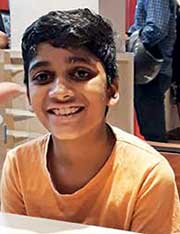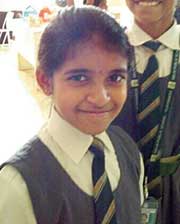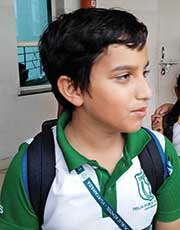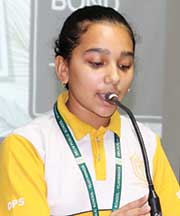Leena Satuluri
In her book, The open classroom, KT Margaret says, “Education is not an impersonal me teaching an impersonal you. It is the process of evolution taking place within both the teacher and the taught.” Margaret’s book has influenced me as a teacher and I keep going back to it for answers.
Pedagogy – It means ‘child is at the centre of learning’. The teacher is not left out on the periphery of this centre of learning though. She/he is very much inside because teaching affects him/her as much as it does the child. In the years that I have taught, from pre-primary to senior secondary, I have been fortunate enough to acquire a treasure trove of knowledge and skills from my students.
I have picked six students out of the many who have made a difference in my professional life. It’s not that I have learnt only from students who are academically sound. I have also learnt great things from students who were strugglers, who had learning difficulties. My daughters, Roshni and Rajani, also become my teachers at times and I their student.
The school where I worked was located in a calm and serene environment. My students of grade 11 were a bunch of thinking individuals; intellectuals too. They could reason and analyze problem situations and also provide solutions. Their knowledge about the world, current affairs, economy, politics, movies, music and technology was advanced. I was way behind. As a teacher of English language and literature, I was happy that they were attentive in my class and were willing to learn, but the fact was that I was learning from them about different subjects through our class discussions.
 Meena was good at literature, so our conversations extended beyond the classroom. We read and exchanged books and even gave each other reviews of the books we read. She encouraged me to write saying I could make a good writer. Though I used to write articles, poems or songs for school, I never paid much attention to my abilities. Just imagine! A student providing the impetus to a teacher to recognize her abilities! It didn’t stop at that. I started writing a novel. After every chapter, she gave me her feedback. After two chapters, Meena found that the men in my story were strong, dominating and cruel while the women were sober, vulnerable and subdued. She asked me why I was portraying the men as negative characters. I was taken aback as I didn’t expect her to be so forthright. I thought I have always been fair with my students and never discriminated on the basis of gender, but it had never occurred to me that I was prejudiced in my mind. I reflected on her feedback and changed my perspective. The book of 200 and odd pages that I had written was only a means of venting out my anger and frustration. Meena’s broad outlook towards life, independent mind and the ability to foresee things, her language skills, both written and spoken, kindled in me the yearning for life-long learning. The first poem that we learnt was ‘La Belle Dame Sans Merci’. When I was leaving the school, she wrote a poem for me titled ‘La Belle Dame with Merci’ with the same number of stanzas, length and metre. Perhaps, it’s time to take it out of my drawer and share with my fellow teachers the first and last couple of stanzas from the poem.
Meena was good at literature, so our conversations extended beyond the classroom. We read and exchanged books and even gave each other reviews of the books we read. She encouraged me to write saying I could make a good writer. Though I used to write articles, poems or songs for school, I never paid much attention to my abilities. Just imagine! A student providing the impetus to a teacher to recognize her abilities! It didn’t stop at that. I started writing a novel. After every chapter, she gave me her feedback. After two chapters, Meena found that the men in my story were strong, dominating and cruel while the women were sober, vulnerable and subdued. She asked me why I was portraying the men as negative characters. I was taken aback as I didn’t expect her to be so forthright. I thought I have always been fair with my students and never discriminated on the basis of gender, but it had never occurred to me that I was prejudiced in my mind. I reflected on her feedback and changed my perspective. The book of 200 and odd pages that I had written was only a means of venting out my anger and frustration. Meena’s broad outlook towards life, independent mind and the ability to foresee things, her language skills, both written and spoken, kindled in me the yearning for life-long learning. The first poem that we learnt was ‘La Belle Dame Sans Merci’. When I was leaving the school, she wrote a poem for me titled ‘La Belle Dame with Merci’ with the same number of stanzas, length and metre. Perhaps, it’s time to take it out of my drawer and share with my fellow teachers the first and last couple of stanzas from the poem.
O What can ail thee, girl with glasses,
Alone and quietly writing?
The power has gone off again
And the mosquitoes sing with strain.
O What can ail thee, girl with glasses,
So thoughtful and so engrossed?
Mum and Grey are waiting with eagerness beyond measure
And the term is nearing closure…
Now she is leaving our place of meeting
And I have still not completed stating,
What she means to me
And what I am yearning to see.
And that is why I sojourn here
Alone and quietly writing
Though the power has gone off again
And the mosquitoes sing with strain
 Darshith was in grade 3 when I was his teacher. He had disciplinary issues and could not focus while the class was going on. His parents requested me to help him with phonetics after school. I refused because I didn’t know how to teach phonetics though I knew what phonetics was. Grade 3 passed by and I failed to help him. But during the summer vacation I learnt how to teach students with reading and writing difficulties. I enrolled in a MOOC (Massive Open Online Courses) on the subject and worked with Darshith for not more than 15 days. During that period, I found in him a willingness to learn. He exhibited keen interest in reading. We were both learning from each other. He was a fast learner contrary to what I believed him to be when he was in grade 3. I learnt that as teachers we need to continuously update ourselves in terms of knowledge and skills. His grade 4 teacher kept giving me feedback on his development and performances. If it weren’t for Darshith, I would never have thought of initiating a support cell for such students in my school. Darshith is in grade 5 now and I am his teacher again.
Darshith was in grade 3 when I was his teacher. He had disciplinary issues and could not focus while the class was going on. His parents requested me to help him with phonetics after school. I refused because I didn’t know how to teach phonetics though I knew what phonetics was. Grade 3 passed by and I failed to help him. But during the summer vacation I learnt how to teach students with reading and writing difficulties. I enrolled in a MOOC (Massive Open Online Courses) on the subject and worked with Darshith for not more than 15 days. During that period, I found in him a willingness to learn. He exhibited keen interest in reading. We were both learning from each other. He was a fast learner contrary to what I believed him to be when he was in grade 3. I learnt that as teachers we need to continuously update ourselves in terms of knowledge and skills. His grade 4 teacher kept giving me feedback on his development and performances. If it weren’t for Darshith, I would never have thought of initiating a support cell for such students in my school. Darshith is in grade 5 now and I am his teacher again.
Naina commands respect at the age of 9. Her work culture is admirable. She is not only an excellent student but also possesses moral values. Naina has only friends in class and no foes. She becomes a peer tutor when needed. Her class was an overactive one. Sometimes, I would give up and fail to manage the class. What I observed was that Naina was able to manage her group with confidence. She displayed leadership skills. Certainly, I didn’t want to be known as a teacher who couldn’t manage her class. Naina taught me that one needs to be firm to get things done. I learnt to be authoritative. Naina is in grade 7 now.
 Sarvani holds a special place in my heart for reasons that I believe are very important. In a class full of kinaesthetic learners which otherwise was labelled as a noisy class, Sarvani was a ray of hope. I was losing my energy and enthusiasm. I also concluded that it is indeed difficult to teach today’s generation. Whenever I felt that I wanted to give up teaching, she would be there to motivate me with her inquisitive eyes. She had incredible writing skills. She was an avid reader too and perhaps it’s because of students like Sarvani that we initiated a Readers’ Cafe in school. She often reminded me of Meena. I learnt to keep myself charged and motivated whenever I felt I was losing hope.
Sarvani holds a special place in my heart for reasons that I believe are very important. In a class full of kinaesthetic learners which otherwise was labelled as a noisy class, Sarvani was a ray of hope. I was losing my energy and enthusiasm. I also concluded that it is indeed difficult to teach today’s generation. Whenever I felt that I wanted to give up teaching, she would be there to motivate me with her inquisitive eyes. She had incredible writing skills. She was an avid reader too and perhaps it’s because of students like Sarvani that we initiated a Readers’ Cafe in school. She often reminded me of Meena. I learnt to keep myself charged and motivated whenever I felt I was losing hope.
 How can I forget Mridin Govind? I taught him when he was in grade 4. I would be extra careful while preparing for the class lest he asks me questions to which I didn’t know the answers. His clarity about his goals, his knowledge of various subjects, his diligence, the zest to achieve perfection and his style of writing keeps motivating me. He taught me that to aim small is a crime. He is now in grade 6 and not my student anymore, but we still talk about books, poems and stories and dream of starting a writers’ club in school.
How can I forget Mridin Govind? I taught him when he was in grade 4. I would be extra careful while preparing for the class lest he asks me questions to which I didn’t know the answers. His clarity about his goals, his knowledge of various subjects, his diligence, the zest to achieve perfection and his style of writing keeps motivating me. He taught me that to aim small is a crime. He is now in grade 6 and not my student anymore, but we still talk about books, poems and stories and dream of starting a writers’ club in school.
 It is rare to find students like Ipshita (class 7) these days. She is genuinely respectful towards teachers and humble when it comes to her achievements. She is polite to her classmates. I admire the sincerity with which she works. Though I taught her for a short time, I must say I still wonder how she keeps her integrity intact even amidst peer pressure. Her principles are rock solid to the core. I learnt that no matter who you are, what your capabilities are, you must be humble.
It is rare to find students like Ipshita (class 7) these days. She is genuinely respectful towards teachers and humble when it comes to her achievements. She is polite to her classmates. I admire the sincerity with which she works. Though I taught her for a short time, I must say I still wonder how she keeps her integrity intact even amidst peer pressure. Her principles are rock solid to the core. I learnt that no matter who you are, what your capabilities are, you must be humble.
I always felt that teaching keeps me sane, rational at the same time neutral in this otherwise divided and prejudiced world. Just as Lee Shulman, American educational psychologist says, “Our school is a community of learners and no one is entitled or obligated to learn more continuously, reflectively and joyfully than teachers themselves.” I think our profession gives us the golden ticket to go on various learning expeditions that have a lifetime validity.
The author is a teacher at Delhi Public School, Vijayawada. She is also a storyteller and teaches theatre art during her free time. She can be reached at leena3278@hotmail.com.
